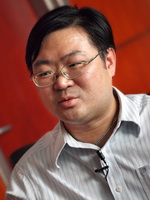Top Biz News
China's shining light in the energy challenge
By Andrew Moody and Bao Chang (China Daily)
Updated: 2010-02-22 11:11
 |
Large Medium Small |
Peng is aware of the important role LDK plays in both local society and the economy. Like many of China's entrepreneurs he sees himself as part philanthropist.
"This is a very small city and we bring a lot of jobs to it. It is my home province and the local government is also very supportive of the solar energy industry," he said.
Peng, who likes to be referred to by his nickname "Light", comes from a rural area of Jiangxi province and is the son of a local doctor.
 |
|
Peng Xiaofeng, chairman and CEO of LDK Solar. |
"When I was at school I was always reading books about light, which is where I got the nickname from," he said.
"My dream was to study physics in the United States. At the time the role model for a lot of young people in China was (Thomas) Edison (the American inventor of the light bulb)."
To achieve his dream, however, he needed to learn English and the only place he could study was at Jiangxi College of Foreign Studies in Nanchang, where he read for for a diploma in international trade.
"There were not many places to learn English and I chose to do this diploma," he said.
While many students often seek such courses as a means to an end, Peng took the qualification literally and on graduating decided to set up his own international trading company with just 20,000 yuan ($2,928) of savings.
In 1997, with China products now in demand throughout the world his timing to start a business couldn't have been better.
His company, Suzhou Liouxin Industrial Group, began to locally manufacture and sell protective products such as safety gloves, jackets and shoes.
"I set up the company by renting an office and buying a fax machine and just learning about international business and how to sell China products overseas. At the time it was very profitable to sell China products."
The business was a spectacular success, soon hitting sales of $7 million and within a few years $200 million.
Instead of having a rented office and a fax machine, he now had a staggering 10,000 employees. He was wealthy.
For many people this would have been enough but Peng felt low-tech manufacturing was somewhat limiting.
He had completed an MBA at the Guanghua School of Management at Peking University on an entrepreneurs program, which had widened his ideas about business.
"It helped me see the bigger picture. It gave me more knowledge about finance, about marketing and about strategy. You also get to know more people from fellow students to professors and so you can bounce ideas off people," he said.
Then came the idea to move into solar power, which was inspired by a trip to Europe.
"I used to travel a lot in Europe at the time and there was a lot of interest in green energy, particularly in Germany. I realized this was a business for the future and a big opportunity to start a business in China," he said.
He spotted there was a shortage in China of companies producing multi-crystalline wafers, the light sensitive tiles which capture light and turn it into usable energy.
"There was a big shortage in the wafer market and at that time wafers were about 70 percent of the cost of producing solar energy," he said.
Private equity investment
He decided to invest $30 million of his own money to launch the business in 2005.
He then had three rounds of private equity investment injecting a further $100 million. The business also had support from the local government.
"It was doing the MBA which taught me about raising capital, whereas my previous business very much generated its own capital," he said.
Two years after starting the business it was floated on the New York Stock Exchange.
"We first targeted a listing on NASDAQ but the NYSE came to us and we were qualified to list on the exchange. We thought strict US company governance would give investors confidence in the business and would be good for long term growth," he said.
"A lot of our investors are now from around the world, from the UK, Frankfurt, Switzerland and Japan."
Having a listing overseas has given Peng a high profile and he is regularly written up as one of China's young billionaires.
Apart from the Forbes listing last year which recorded him as the 462nd richest person on the planet, estimating his personal fortune at $2.5 billion, he has also come to the attention of Fortune magazine.
It listed him as 23rd of 40 of the "hottest business stars" under the age of 40 in the world.
In the same list, Facebook founder Mark Zuckerberg was second, News Corporation's James Murdoch was third and golfer Tiger Woods, before recent tribulations in his life, was placed sixth.
Peng does not think he is part of some new homegrown Chinese business talent that is going to take over the world any time soon.
"If you look at the young entrepreneurs on that list, only two are from China. Most of them are from Russia, the United States and elsewhere. I think people of the younger generation have a similar chance from anywhere," he said.
He acknowledges, however, that the opportunities for young entrepreneurs in China have never been greater.
"We are very lucky in this generation, especially, say, compared with the opportunities my parents had. We have greater access to education, the chance to meet people in Europe, the US and internationally. You also have the benefits of globalization, access to foreign capital and to buy equipment and bring in expertise from such countries as the US, Germany and Japan," he said.
China is now one of the major world centers for solar power.
The future of solar power is still dogged by questions about its cost. Oil, depending on its current price, costs around 5 cents to produce a kilowatt hour (KWh) of energy, coal between 4.8 and 5.5 cents and gas between 3.9 and 4.4 cents, whereas solar power can cost as much as 30 cents per kilowatt hour.
Peng says the cost is being driven down all the time as the technology improves.
"If you go back 50 years it used to cost about $500 per KWh. In China now it is already down to 20 cents," he said.
Still only in his mid-30s, Peng has every intention of being around when the age of solar power finally dawns.
"I want to focus on the solar power industry continuously into the future since the industry is large and emerging. I am sure the sorlar power will be one of the leading future technologies," he said.













